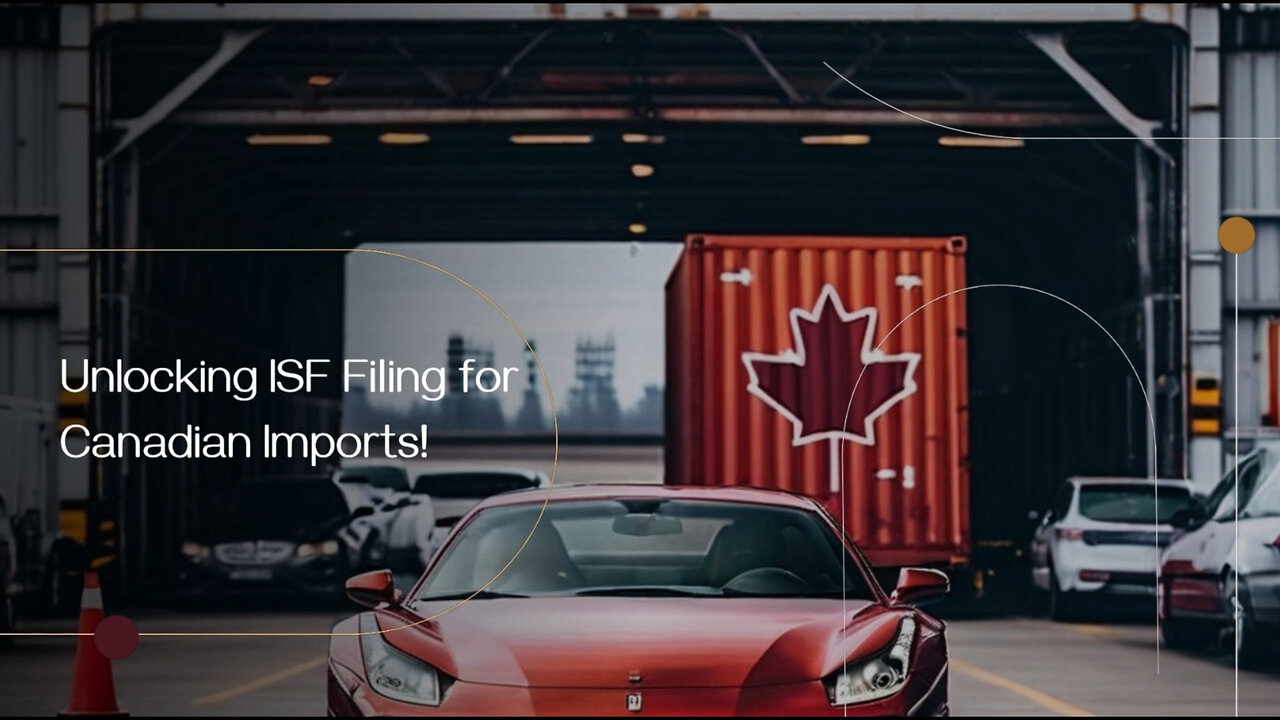Premium Only Content

Unlocking the Secrets of ISF Filing: A Guide for Importers of Canadian Goods
ISF Filer || isf@isffiler.com || 858-280-9374 || www.isffiler.com
Welcome back to our video series on customs brokerage and international trade. In today's episode, we will be discussing the ISF filing requirements for Canadian imports. ISF, or Importer Security Filing, is a crucial part of the customs clearance process that aims to enhance security measures while facilitating trade. So let's dive right in and explore the key aspects of ISF filing.
ISF is a mandatory filing that needs to be submitted to the customs authorities before the arrival of goods into the country. It applies to shipments entering the United States by vessel. The purpose of ISF is to provide customs authorities with vital information to assess risk and conduct effective cargo security screening.
The ISF filing consists of several important components, including manufacturer or supplier information, buyer or importer details, consolidator or shipping information, container stowage location, description of the goods, HS code, bill of lading or booking number, foreign port of unlading, and place of delivery. Each of these components plays a crucial role in ensuring the smooth and secure movement of goods across borders.
The timeline for submitting the ISF filing is at least 24 hours before the cargo is loaded onto the vessel at the foreign port. Non-compliance with this timeline can result in penalties and delays in the clearance process. To ensure compliance and smooth customs clearance, many importers choose to work with a customs broker who provides expert advice and assistance in preparing and submitting the necessary documentation.
Non-compliance with ISF filing requirements can lead to penalties imposed by Customs and Border Protection (CBP), ranging from monetary fines to non-release or seizure of the cargo. It is crucial for importers to understand the requirements and meet the filing deadlines to avoid any such issues.
Despite the potential penalties, ISF filing offers several benefits to importers. By providing advance information, importers can expedite the clearance process, reduce the risk of inspections, and ensure timely delivery of goods. Furthermore, complying with the security measures laid out by customs authorities contributes to enhanced supply chain security.
We hope this episode has shed light on the importance of ISF filing for Canadian imports and the key components that need to be included. If you have any further questions or would like more information, feel free to reach out to us. Stay tuned for our upcoming videos covering more exciting topics related to customs brokerage and international trade. Thank you for watching, and we look forward to seeing you in the next episode!
#usimportbond #isfcustomsbroker #uscustomsclearing #isfentry
Video Disclaimer Here: This video is intended for educational purposes and has no affiliation with US government entities.
00:26 - ISF Filing is a mandatory requirement for Canadian imports to enhance security measures and facilitate trade.
00:45 - Key components of ISF filing include information about manufacturers, buyers, container stowage, goods description, HS code, and more.
01:33 - ISF filing must be submitted at least 24 hours before cargo is loaded onto the vessel to avoid penalties and delays.
01:52 - Working with a customs broker can help importers ensure compliance with ISF filing requirements and avoid penalties, while also expediting the clearance process and enhancing supply chain security.
-

Rotella Games
17 hours agoGrand Theft America - GTA IV | Day 1
8.33K2 -
 8:16:19
8:16:19
Joe Donuts Gaming
11 hours ago🟢Fortnite Live : Chill Vibes Lounge!
44.9K4 -
 38:43
38:43
Standpoint with Gabe Groisman
6 hours agoEp. 63. Terror Strikes the Nova Music Festival. Ofir Amir
108K38 -
 36:04
36:04
Forrest Galante
16 hours agoPrivate Tour of an Indian Billionaire’s Secret Wildlife Rescue Center
81.2K12 -
 9:37
9:37
Space Ice
1 day agoMorbius Is The Perfect Movie, Everyone Just Lied To You - Best Movie Ever
74.7K27 -
 17:09
17:09
Guns & Gadgets 2nd Amendment News
1 day agoWhy I Left The USCCA
50.3K39 -
 21:33
21:33
Degenerate Jay
2 days ago $2.72 earnedThe Best Video Game Movie Ever Made? Sonic The Hedgehog 3 Movie Review
51K1 -
 19:57
19:57
BlackDiamondGunsandGear
4 days agoIS 22LR ENOUGH?
82.9K25 -
 1:59:47
1:59:47
Anthony Rogers
23 hours agoLIVE Comedy @ Cusumano's Pizza (Upstairs)
55.1K2 -
 5:02:46
5:02:46
MoFio23!
21 hours agoNintendo Switch It UP Saturdays with The Fellas: LIVE - Episode #1
127K15